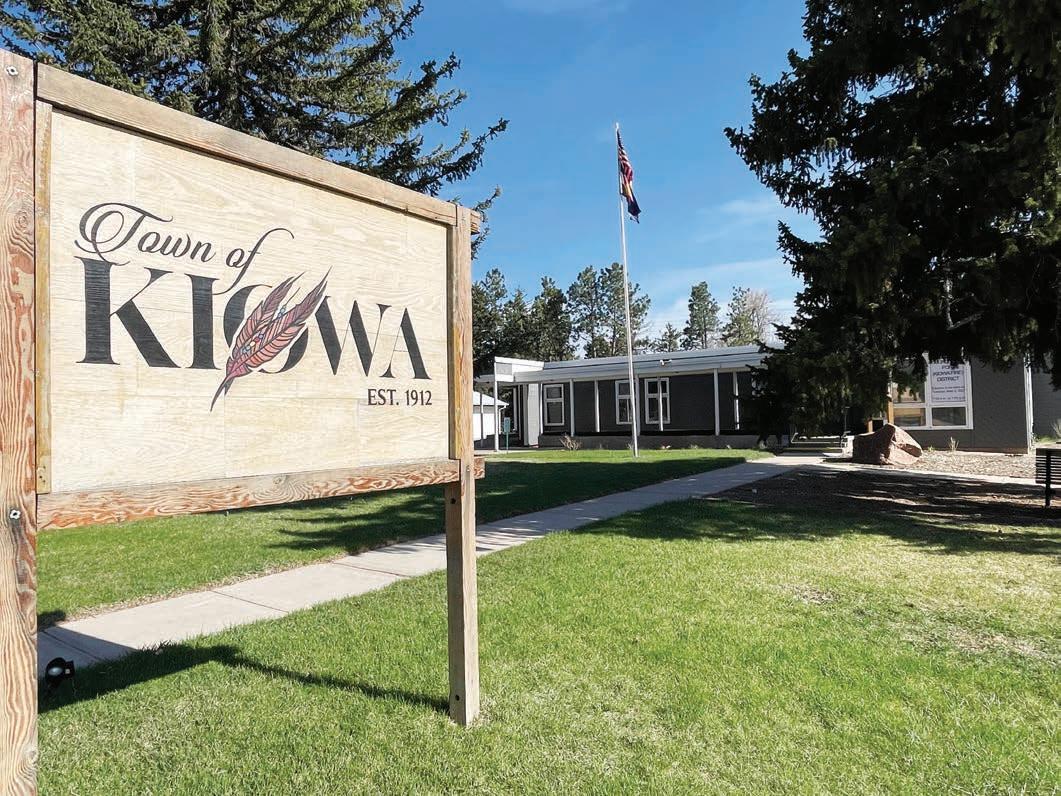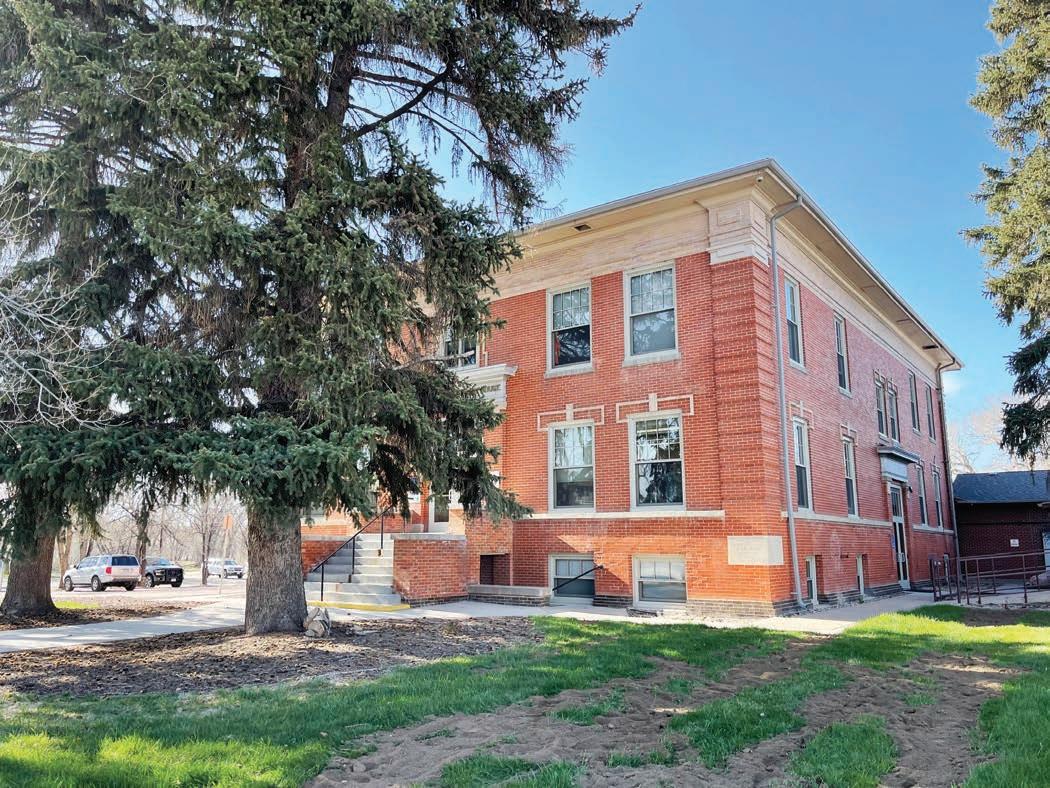
4 minute read
Kiowa seeks improvement grants
Town requests millions in funding for revitalization
BY CHANCY J. GATLIN-ANDERSON SPECIAL TO COLORADO COMMUNITY MEDIA

e Town of Kiowa has applied for several multi-million-dollar grants to help fund improvements throughout the area. ese include the Drainage and Sidewalks Project to revitalize the town’s walkability and the Water Redundancy Project to generally improve the Kiowa Water and Wastewater Authority’s infrastructure.
e town also recently received two $25,000 grants through the Colorado Department of Local Affairs, one to carry out a rate study for the Kiowa Water and Wastewater Authority and one to update the Town of Kiowa Comprehensive (Master) Plan.

Below is a summary of each of the grants along with comments from Kiowa Town Administrator Kimberly Boyd.
Town of Kiowa Drainage and Sidewalks Project


On April 21, the Town of Kiowa applied for a Transportation Alternatives Program (TAP) Grant from the Colorado Department of Transportation (CDOT) seeking $2 million
Small
in funding for the engineering and design portion of the drainage and sidewalks project. e total project is estimated to cost about $12 million to $13 million.
“Over the course of thirty-plus years, winter icing has severely deteriorated the sidewalks, curb, gutter, and street along the main drag of downtown Kiowa, along both sides of CO-86, creating extremely unsafe conditions for pedestrians, bikes, and particularly those using mobility devices in those areas,” Boyd wrote in a May 2 email. “ is grant would allow the Town to get started on a long overdue, critical project.” e increases are causing many homeowners to be concerned about their nancial futures. State lawmakers and local leaders have been working to devise plans for taxpayer relief in the face of growing property-tax bills.
Two 2023 state Senate bills were introduced that would o er relief to homeowners in the form of reduced property taxes. SB23-303 was introduced on May 1, while SB23-108 was introduced earlier in the year on Jan. 31.
Below are summaries of both Senate bills accompanied by comments from Elbert County Commissioner Christopher Richardson. The outcome of both measures will need to be decided by the adjournment of the Colorado General Assembly on May 8, which is after the Elbert County News press deadline. Go online to elbertcountynews.net for updates on what became of the bills.
SB23-303
On May 1, Gov. Jared Polis and members of the Senate Appropriations Committee announced a historic $1 billion property tax relief plan known as SB23-303. e plan would provide long-term property tax rate reductions and valuation limitations, as well as immediate savings on this year’s property taxes.
SB23-303, combined with reductions previously passed, would cut the average homeowner’s tax increase in half, saving $1,264 on average over the next two years. In total, this package would provide up to 1.6 billion annually in property tax relief for homeowners and commercial property owners in Colorado. If it survives the legislative session, Colorado voters will decide in November whether to approve the plan.
“ e governor’s plan has some very good points. Probably the most impactful piece is raising the homestead exemption to 50% of the rst $200k,” commented Elbert County Commissioner Christopher Richardson in a phone interview from May 1.



According to the governor’s press release, tax relief and protections proposed in this plan include the following:
1. Reducing the residential assessment rate from 7.15% to 6.7% in 2023 and 2024, and continuing this reduction for primary residences (not second homes or investment properties) in future years.
2. Reducing the taxable value of residences by $40,000 in 2023 and 2024, and continuing this reduction for primary residences (not second homes or investment properties) in future years.
3. Capping the growth in district property tax collections excluding school districts at in ation and allowing local governments to override the cap after giving notice to property owners.
4. Protecting funding for public education and back lling revenue to re districts, water districts, ambulance and hospital districts in areas of the state that aren’t growing as fast by dedicating a portion of the state TABOR surplus to back ll.
5. Providing seniors who currently receive the Homestead Exemption a larger reduction of [up to] $140,000 [of taxable property value] and allowing them to continue to receive this reduction if they move.
“We still don’t know what SB23303 will be like at its nal form. I certainly like pieces of Polis’ plan,” said Richardson. “I certainly like the TABOR cap, but it’s going to the vote of the people, as it should.”
SB23-108
Also on May 1, the Elbert County commissioners sent out a press release urging citizens to contact Colorado House Majority Leader Monica Duran to advance the stalled Senate Bill 23-108. SB23-108 would allow a local government to provide temporary tax relief through temporary tax credits or mill levy reductions and later eliminate the credits or restore the mill levy. On March 1, the bill passed with a Senate vote of 35 to 0 and has been awaiting nal approval in the House since April 13. From the date of the press release, the Colorado House of Representatives had seven days to vote on the bill.
“Within my district (District 1), and the county as a whole, we could see an increase in property taxes of 35%-45%,” said Richardson. “We want SB23-108 to pass because we don’t need that increase. at would be an almost $4.8 million increase. We certainly don’t need that to run the county.”
At the time of the commissioners’ press release on May 1, SB23-303 had not yet been released, though Gov. Polis had announced that he was working with Colorado legislators on his own bill to provide relief for taxpayers. In the press release, the commissioners voiced their concerns for Polis’ SB23-303, stating that it could be rushed. ey also spoke about the bene ts of SB23-108 in contrast.
“It is unknown who is providing input or who is drafting the Governor’s mystery bill, or what it might contain,” the release said. “We do know it will have to be rushed through the committee hearing process with little chance for public scrutiny in less than one week if it is to be enacted this year. By contrast, SB23-108 is a simple 3-page bill that is poised for passage and has been carefully crafted with strong bi-partisan support to serve a single purpose — provide local property tax relief under the control of local taxing authorities.”
“If the Polis plan were to fail in November, SB 23-108 would give us a fall back of at least being able to reduce the mill levy,” commented Richardson.
For more information on Senate Bill 23-303, visit leg.colorado.gov/ bills/sb23-303.
For more information on Senate Bill 23-108, visit leg.colorado.gov/ bills/sb23-108.












